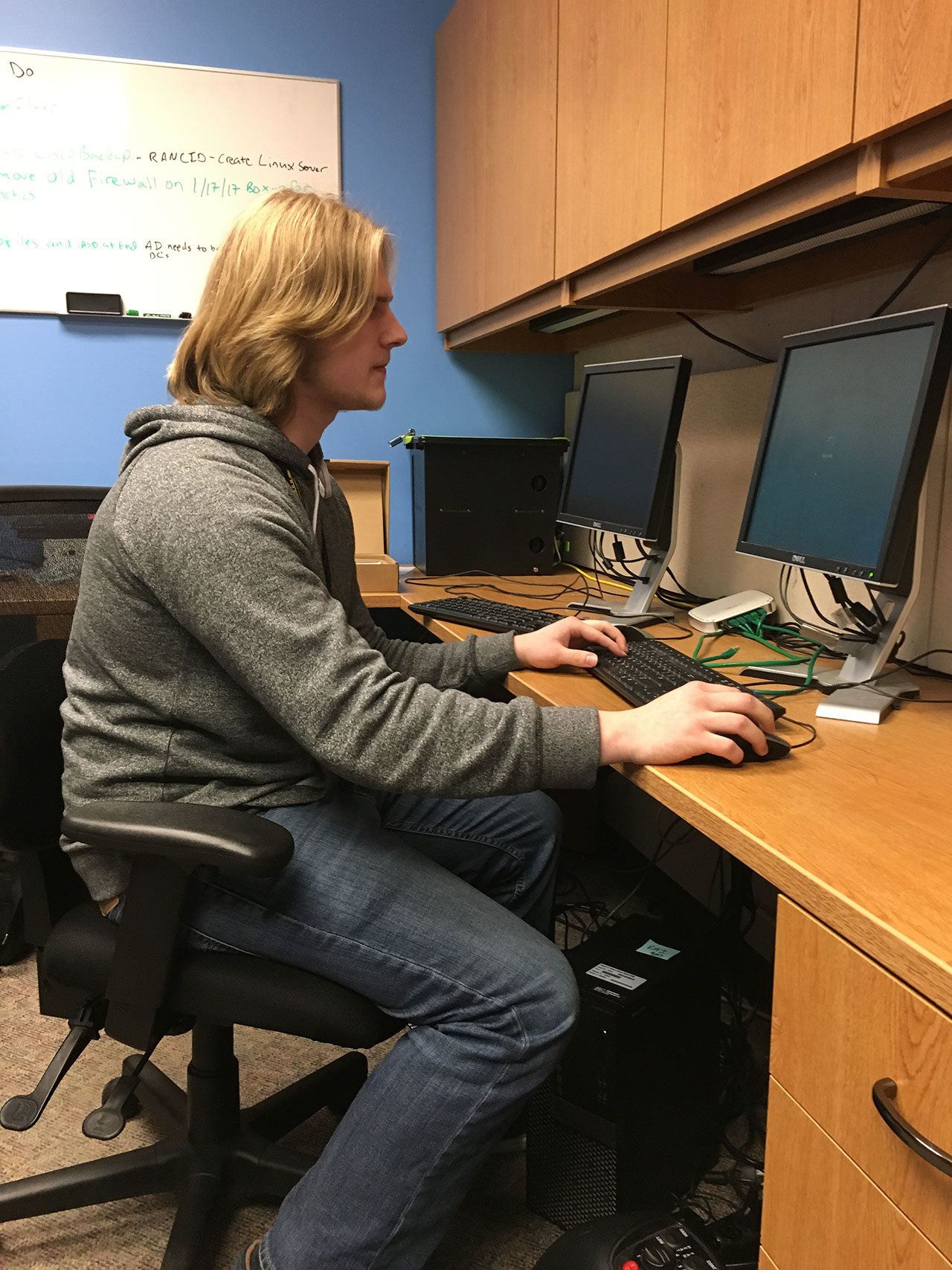In a different scenario, Kyle Lease might have been forced to wait until college to pursue the career path he was interested in.
But Lease got a head start in that direction three years ago, through the Auburn School District’s technology department internship program.
The program is open to ASD high-schoolers during the second semester. Twice per week, the interns work to learn concepts, such as networking, cabling standards, security and much more. They also job shadow and assist with deploying technology.
“They’ll get a taste of what an IT department does,” said Rick Fawver, a network engineer for ASD who also leads its junior internship program. “They’ll go out on a project. We also pair them up with members and walk into classrooms together. How to approach a classroom, teacher and how we do our job. They’ll learn how we assess the problem and fix the problem.”
And they get paid.
When Lease was selected for the program in 2014, he worked five hours per week when class was in session and picked up more time during spring break. Lease continued on during that summer and helped the set up the technological infrastructure at the new Auburn High School.
“I think I worked a couple of 40-hour workweeks,” he said. “I earned a lot of money that summer.”
Technology interns are paid minimum wage, but Lease said the work has had significant financial implications for him. Through the position, Lease was classified as a state employee. That made him eligible for the state’s Tuition Exemption Program, which he used to enroll at Green River College.
Lease is the latest example of the program serving as a springboard to a career in technology. The program formally was launched in 1994, but Jennifer Clouser interned at the school district headquarters through her mentorship class as an Auburn High senior in 1988-89. Clouser, who is ASD’s executive director for the Department of Technology, has worked for the district since she earned her bachelor’s degree in business administration in 1991 from Central Washington University.
At that point, Clouser said, she often was tasked with printing and deliveries. The transportation component remains, said Megan Turner, a network engineer for ASD who runs the senior internship program. She said interns need to have a vehicle because “we need them to be mobile.” But much has changed since the program was introduced because of technological upgrades.
Turner said the instruction that she and Fawver provide can shift on an annual basis.
“Every class is different,” she said. “One year, we could get kids that are super into it and already kind of know the things that we would teach them. Other years, you will get half the kids that have never done anything but they have an interest in computers, and the other half know some things.”
Turner said she strives to develop students’ social skills as well. She said that is important because students must know how to interact with teachers when they enter a classroom to set up a computer or another task.
“We’ve had some kids that over the years that when they came in, I could barely get them to talk,” Turner said. “By the end, I had them making jokes. There’s always kind of this dynamic when they start.”
She said employees in the technology department strive to treat the internship as much “like a real-life scenario” as possible. But Turner said they also understand that students are busy and they need to work to accommodate their schedules.
“The kids that have done robotics, we work around that,” she said. “We always tell them that they are a student first and an intern second.”
Fawver said students are recommended by building technicians, who “promote and recruit” for the program.
“They collect all of the information and they funnel it over here,” he said. “We screen and decide who we want to meet with.”
The deadline to apply for the 2017-18 school year was Jan. 13. Turner said students must have traditional application elements, such as a cover letter, résumé and references, to apply.
The number of interns hired varies each year, but two to four could finish the program. Some leave because they become disinterested in the nuances of technology, while others do not realize the physical demands of the profession.
“You should wear jeans because you’re going to get dirty,” Turner said. “Make sure bring lots of water to drink because you’re going to be doing a lot of hard work.”
Those that complete the first portion of the program, such as Lease, are required to pass a final examination. When that occurs, Clouser said students become eligible for summer jobs through the program and after-school work when classes resume.
For Lease, the program has taught him about many aspects of technology, including an Open Systems Interconnection model of a computing system. It also allowed him to figure out a career path before he started college.
“I’m trying to get my bachelor’s in IT network and security administration,” he said. “I want to go into penetration testing.”




